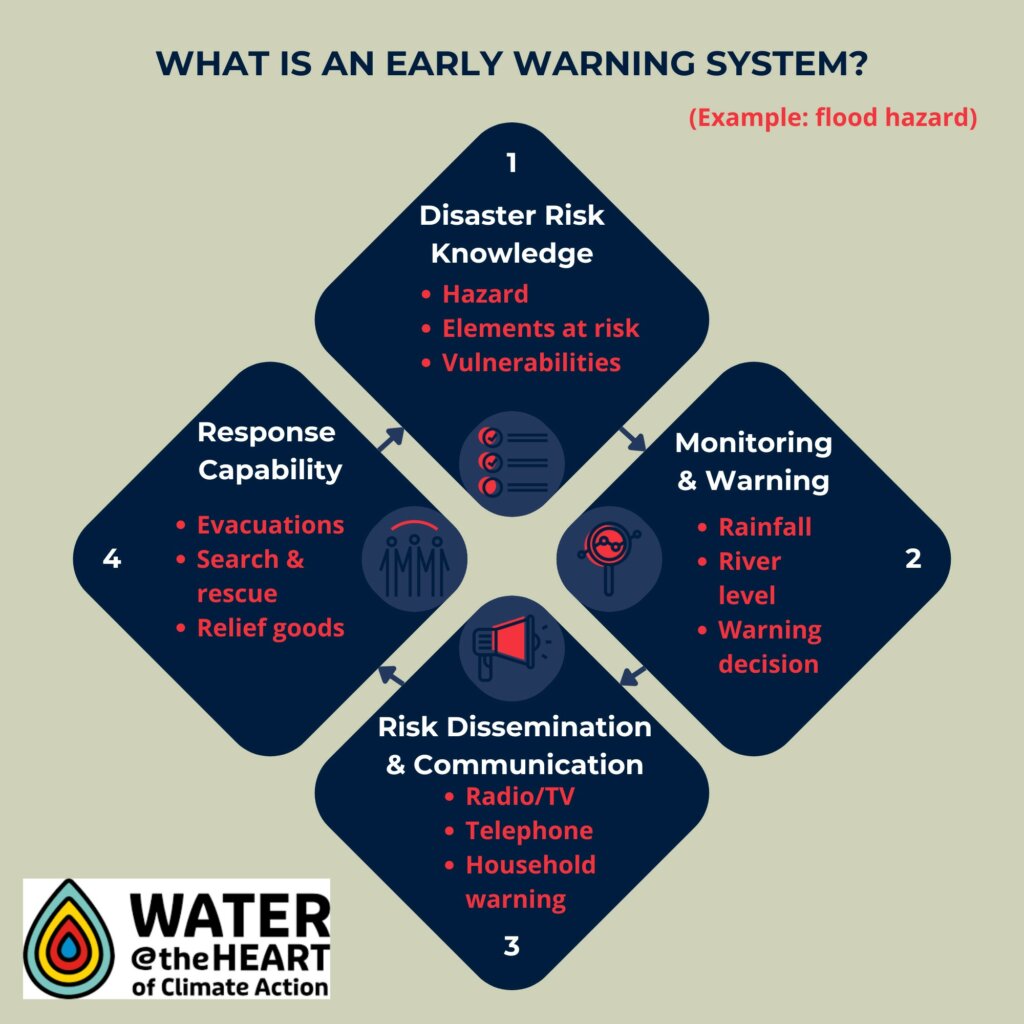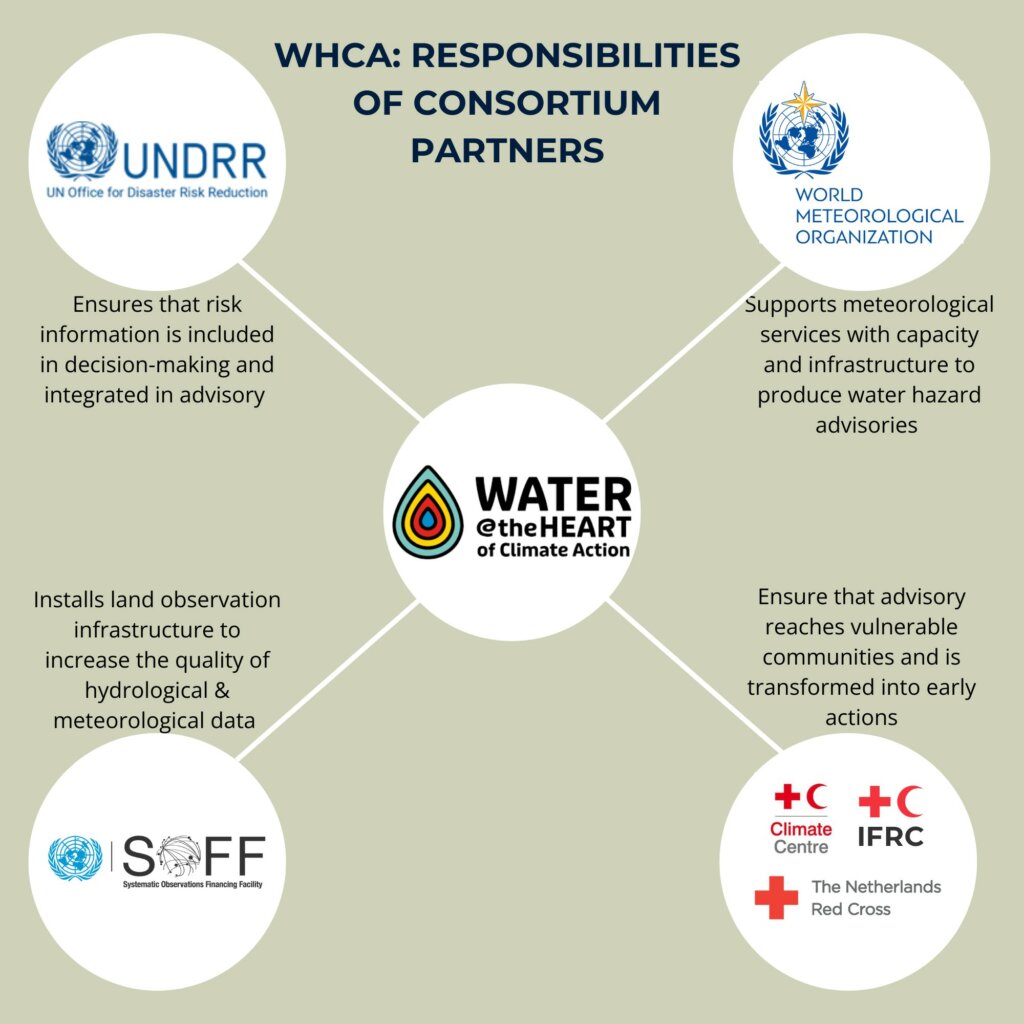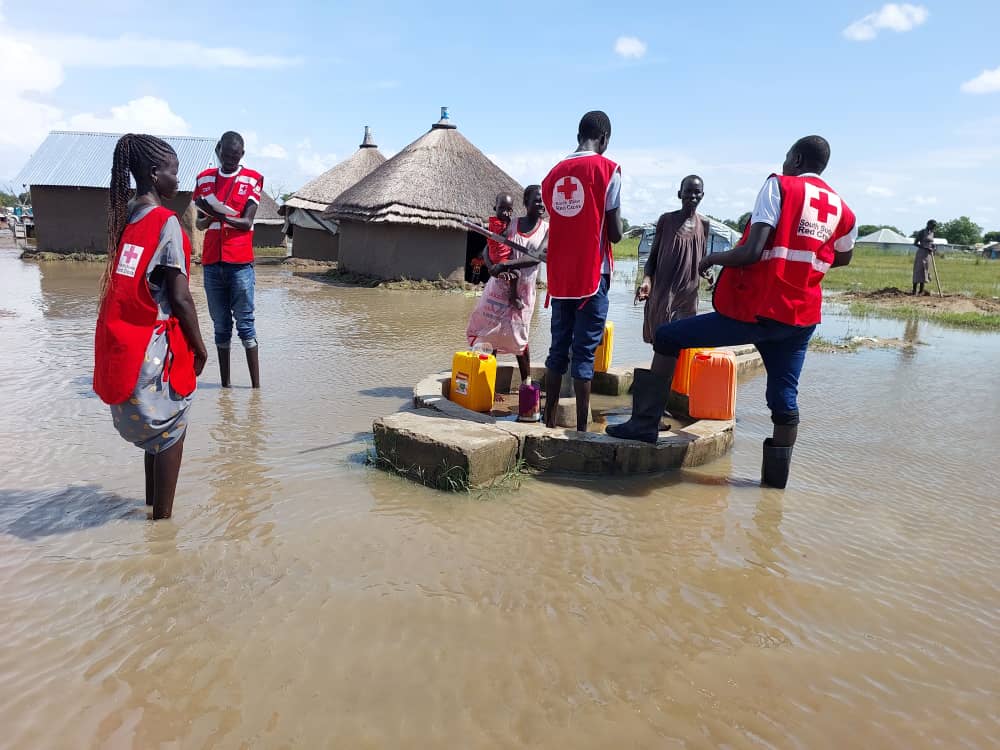Œuvre d'art d'en-tête : "Je suis une goutte d'eau" par Rojo Ham, Kigali, 2024

Les catastrophes liées à l'eau font partie des crises les plus destructrices auxquelles l'humanité est confrontée. Pour les atténuer, des systèmes d'alerte précoce (EWS) peuvent informer les communautés des risques imminents à temps pour qu'elles puissent prendre des précautions. Le programme "L'eau au cœur de l'action climatique" (WHCA) vise à mettre en place ou à améliorer les systèmes d'alerte précoce dans les zones vulnérables, afin d'aider les communautés à s'adapter aux changements climatiques et à accroître la résilience de l'eau en Éthiopie, au Rwanda, au Sud-Soudan, au Soudan et en Ouganda. Le programme WHCA est un partenariat entre la FICR ("Systematic Observations Financing Facility"), la facilité de financement des observations systématiques ("Systematic Observations Financing Facility").SOFF), le Bureau des Nations unies pour la réduction des risques de catastrophes (UNDRR) et l'Organisation météorologique mondiale (OMM). Ce partenariat est financé par le ministère des affaires étrangères des Pays-Bas.
L'urgence d'intégrer la gestion de l'eau dans la prévention des catastrophes
Neuf catastrophes climatiques sur dix survenues ces dernières années sont liées à l'eau.. Pourtant, les initiatives sur le climat et l'eau sont souvent cloisonnées et ne sont pas prises en compte par les acteurs locaux. L'intégration de la gestion de l'eau dans l'action climatique est nécessaire pour sauver des vies et des moyens de subsistance. Les systèmes d'alerte précoce sont donc essentiels pour fournir aux communautés les informations dont elles ont besoin pour rester en sécurité. Pour avoir un impact, ces systèmes doivent être centrés et dirigés par les communautés, et soutenus par des collaborations entre les gouvernements nationaux, les organisations internationales et leurs équivalents locaux. C'est là que l'AMSC entend faire la différence :
"Nous devons considérer l'eau et le climat ensemble, et c'est là que les acteurs mondiaux peuvent vraiment changer les choses. La WHCA a rassemblé des acteurs mondiaux clés avec des homologues locaux présents dans chaque pays. Ensemble, ils ont mis en place l'action pour l'eau dont nous avons besoin de toute urgence pour relever les défis climatiques sans laisser personne de côté".
Stefania Giodini, responsable de l'eau, du conseil et de l'innovation à la Croix-Rouge néerlandaise
Travailler ensemble pour un impact plus fort

Une action climatique efficace nécessite une coopération entre les secteurs et les frontières. Le consortium WHCA comprend plusieurs acteurs mondiaux, chacun apportant une expertise spécifique. Ainsi, le partenariat offre une approche globale combinant la technologie mondiale et les connaissances locales pour aider les communautés à agir sur les risques liés à l'eau auxquels elles sont confrontées - avant qu'ils ne se transforment en catastrophes.
"Cette collaboration entre organisations est unique et nécessaire si nous voulons réduire l'impact des risques liés à l'eau sur les communautés vulnérables. Ce n'est qu'en travaillant ensemble que nous pourrons agir sur l'ensemble de la chaîne de valeur de l'alerte précoce, des satellites aux sacs de sable".
Elseline Tuinier, coordinatrice du consortium WHCA à la Croix-Rouge néerlandaise
La Croix-Rouge néerlandaise dirige le consortium WHCA dans cet effort transnational et sectoriel visant à créer des réponses efficaces. Active au niveau communautaire, la Croix-Rouge néerlandaise travaille avec les sociétés nationales des pays participants pour mettre en œuvre des activités adaptées aux besoins sur le terrain. À ce stade du programme, les évaluations de la vulnérabilité et des capacités menées par les Sociétés nationales ont jeté les bases de l'engagement des communautés dans l'identification des défis et l'élaboration conjointe de plans d'action. En intégrant la prise de décision ascendante et la synergie inter-agences, le programme crée un précédent pour une action climatique inclusive et durable.
"Il faut créer un sentiment d'appartenance au niveau local et favoriser une collaboration étroite avec les agences gouvernementales. Si vous voulez avoir un impact au niveau local, les acteurs locaux doivent être impliqués et diriger les activités à mettre en œuvre".
Floor Lammers, responsable du programme WHCA à la Croix-Rouge néerlandaise
Promouvoir des solutions locales au Sud-Soudan
Au Sud-Soudan, l'interaction entre l'eau et le climat est une préoccupation urgente car elle exacerbe les risques d'insécurité alimentaire, de déplacement et de pénurie d'eau, menaçant la vie et les moyens de subsistance de millions de personnes. Pour faire face à ces risques, il est essentiel de tirer parti des alertes précoces, des connaissances locales et des stratégies inclusives. Le Sud-Soudan vise à institutionnaliser la gestion de l'eau grâce à des solutions communautaires, telles que des messages d'alerte précoce conçus en commun et des plans de réponse aux inondations et à la sécheresse adaptés au niveau local. La clé de ces stratégies est une participation équitable de tous les groupes démographiques, garantissant que chacun est inclus dans les efforts de résilience climatique à l'échelle du pays.

Les stratégies de prévention des catastrophes doivent être informées au niveau local et adaptables. L'initiative WHCA place les communautés aux commandes de l'élaboration de plans d'intervention basés sur leurs propres forces et vulnérabilités, en étroite collaboration avec les gouvernements nationaux et les agences météorologiques. De cette manière, les SAP sont précis, opportuns et accessibles à tous, ce qui empêche les risques liés à l'eau de devenir des crises à part entière.
"Si vous voulez aller vite, allez-y seul ; si vous voulez aller loin, allez-y ensemble. Pour lutter contre les catastrophes liées au climat, il faut briser les cloisonnements entre les organisations, les gouvernements et les communautés. Grâce à des échanges fructueux, nous plaçons les communautés au cœur de la mise en œuvre et nous faisons progresser les adaptations locales qui sont durables, inclusives et engagées dans l'amélioration des systèmes et des infrastructures de l'eau."
Desmond Ongara, WASH Délégué de la Croix-Rouge néerlandaise auprès de la Croix-Rouge du Sud-Soudan
La Croix-Rouge du Sud-Soudan joue un rôle essentiel dans le renforcement des capacités de lutte contre les catastrophes liées à l'eau. En collaboration avec le service météorologique du Sud-Soudan, le ministère des ressources en eau et de l'irrigation, le ministère des affaires humanitaires et de la gestion des catastrophes et d'autres partenaires, la Société nationale conçoit des interventions basées sur les résultats de l'engagement communautaire et les informations météorologiques. Cette approche collaborative favorise le dialogue entre les partenaires et les communautés. Malgré les difficultés liées aux conflits et aux conditions météorologiques extrêmes, ces initiatives communautaires ont fait preuve d'une remarquable longévité en intégrant avec succès les systèmes d'alerte précoce à des plans d'action, ce qui laisse espérer une gestion durable de l'eau grâce à une adaptation menée au niveau local au Sud-Soudan.
"Nous avons progressivement investi dans le renforcement des capacités de réponse aux menaces liées à l'eau en formant des équipes d'intervention en cas de catastrophe dans le domaine de l'eau, de l'assainissement et de l'hygiène (WASH), en prépositionnant des kits d'intervention WASH et en construisant ou en modernisant des infrastructures WASH résilientes au climat. Nous prévoyons de renforcer encore ces capacités en tirant parti de technologies innovantes, telles que la solarisation de nos unités de traitement des eaux de surface en cas d'urgence.''
David Mitu, responsable WASH à la Croix-Rouge du Sud-Soudan
"Nous ont mis au point une Portail de prévisions basées sur l'impact à Bor, en collaboration avec des partenaires, qui aide les communautés à se préparer aux inondations. Suite aux ambitions du gouvernement de planter 10 millions d'arbres, nous nous sommes engagés, en tant que Société nationale, à contribuer à la plantation d'un million d'arbres pour améliorer la résilience climatique. Nous nous attendons à ce que nos efforts en matière de réduction des risques de catastrophe soient accélérés dans le cadre du programme WHCA.."
Moro Baba Emmanuel Awasi, responsable des risques de catastrophes à la Croix-Rouge du Sud-Soudan
La voie à suivre : Permettre à tous de bénéficier d'alertes précoces
L'eau ne respecte pas les frontières nationales. La WHCA adopte une approche à l'échelle du bassin parmi les pays participants le long du Nil, encourageant la collaboration transfrontalière et permettant aux pays voisins de partager leurs connaissances et d'apprendre les uns des autres. Cela permet également de s'assurer que les systèmes d'alerte précoce sont adaptés aux effets en cascade des phénomènes météorologiques extrêmes transfrontaliers. En ciblant particulièrement les communautés vulnérables à la sécheresse et aux inondations, l'initiative WHCA vise à avoir l'impact le plus important possible là où il est le plus nécessaire, en aidant les acteurs locaux à préserver leur avenir.
Bien que la WHCA cible des actions dans le bassin du Nil, les avantages d'un SAP robuste s'étendent à l'échelle mondiale. Les données collectées par les services météorologiques locaux contribuent à l'élaboration de modèles de prévision mondiaux de plus en plus précis, ce qui signifie que l'investissement dans les systèmes d'alerte précoce peut permettre de passer d'une aide réactive aux catastrophes à une prévention proactive, en aidant les communautés à atténuer l'impact des catastrophes liées à l'eau. Les solutions locales sont au cœur de cette approche, et les partenariats mondiaux ouvrent la voie à un avenir mieux préparé aux catastrophes.
*Dans ce contexte, le réseau de la FICR fait référence à l'ensemble du réseau de la FICR. Fédération internationale des sociétés de la Croix-Rouge et du Croissant-Rouge, le Croix-Rouge néerlandaise, le Centre climatique de la Croix-Rouge et du Croissant-Rouge, le Société de la Croix-Rouge éthiopienne, la Croix-Rouge rwandaise, la Croix-Rouge du Sud-Soudan, les Société du Croissant-Rouge soudanaiset le Société de la Croix-Rouge de l'Ouganda.
CLAUSE DE NON-RESPONSABILITÉ : Veuillez noter que les versions arabe, française et espagnole de cet article ont été générées automatiquement à l'aide de l'intelligence artificielle. Nous ne pouvons pas garantir l'exactitude de ces versions.
Nous voulons vous entendre !
Vous souhaitez en savoir plus sur ce programme ou mettre en œuvre des solutions similaires avec votre Société nationale ? N'hésitez pas à nous contacter :
Responsable du consortium WHCA : Elseline Tuinier etuinier@redcross.nl
Responsable du programme WHCA : Floor Lammers flammers@redcross.nl
Chef du service de conseil et d'innovation dans le domaine de l'eau : Stefania Giodini sgiodini@redcross.nl
Coordinateur de services, Action anticipée : Aklilu Teklesadik ateklesadik@redcross.nl
Coordinateur de service, eau et paysage : Marijke Panis mpanis@redcross.nl